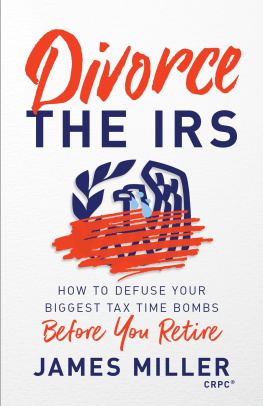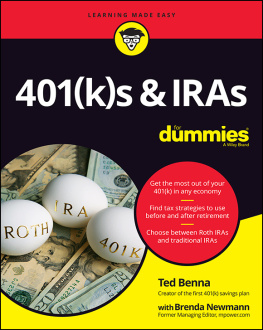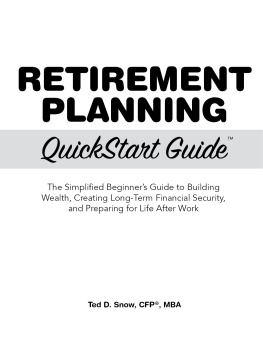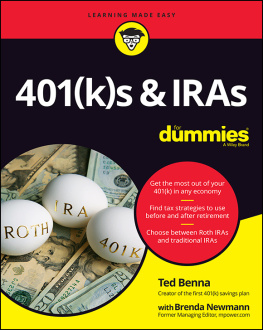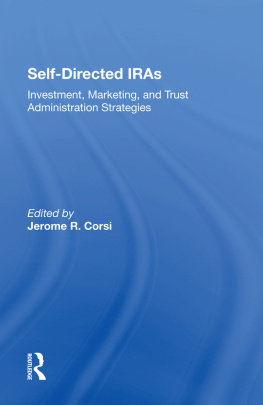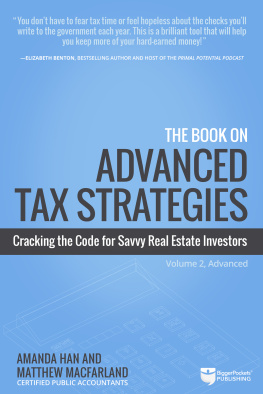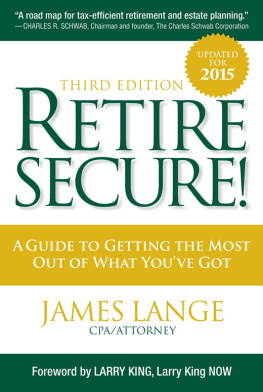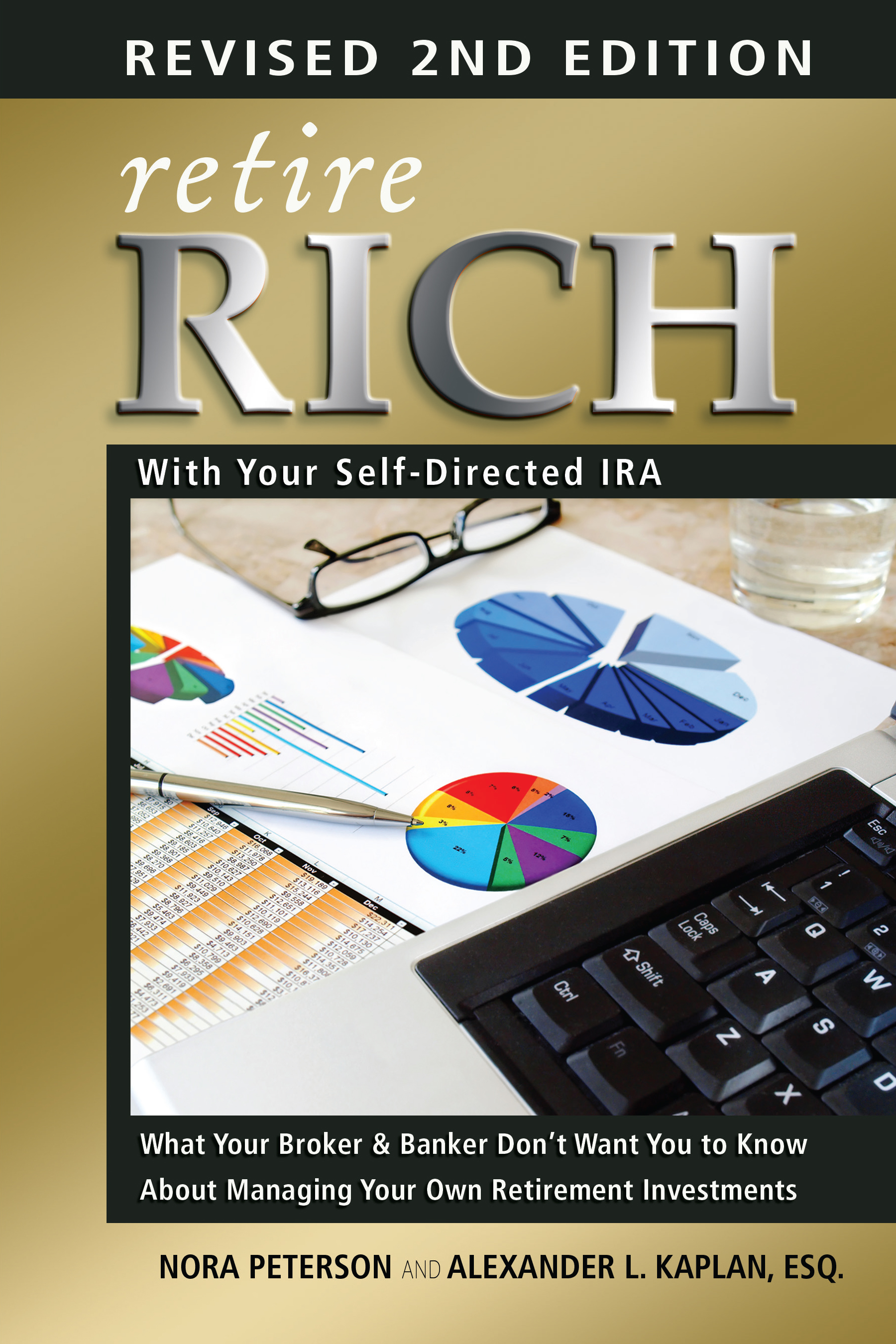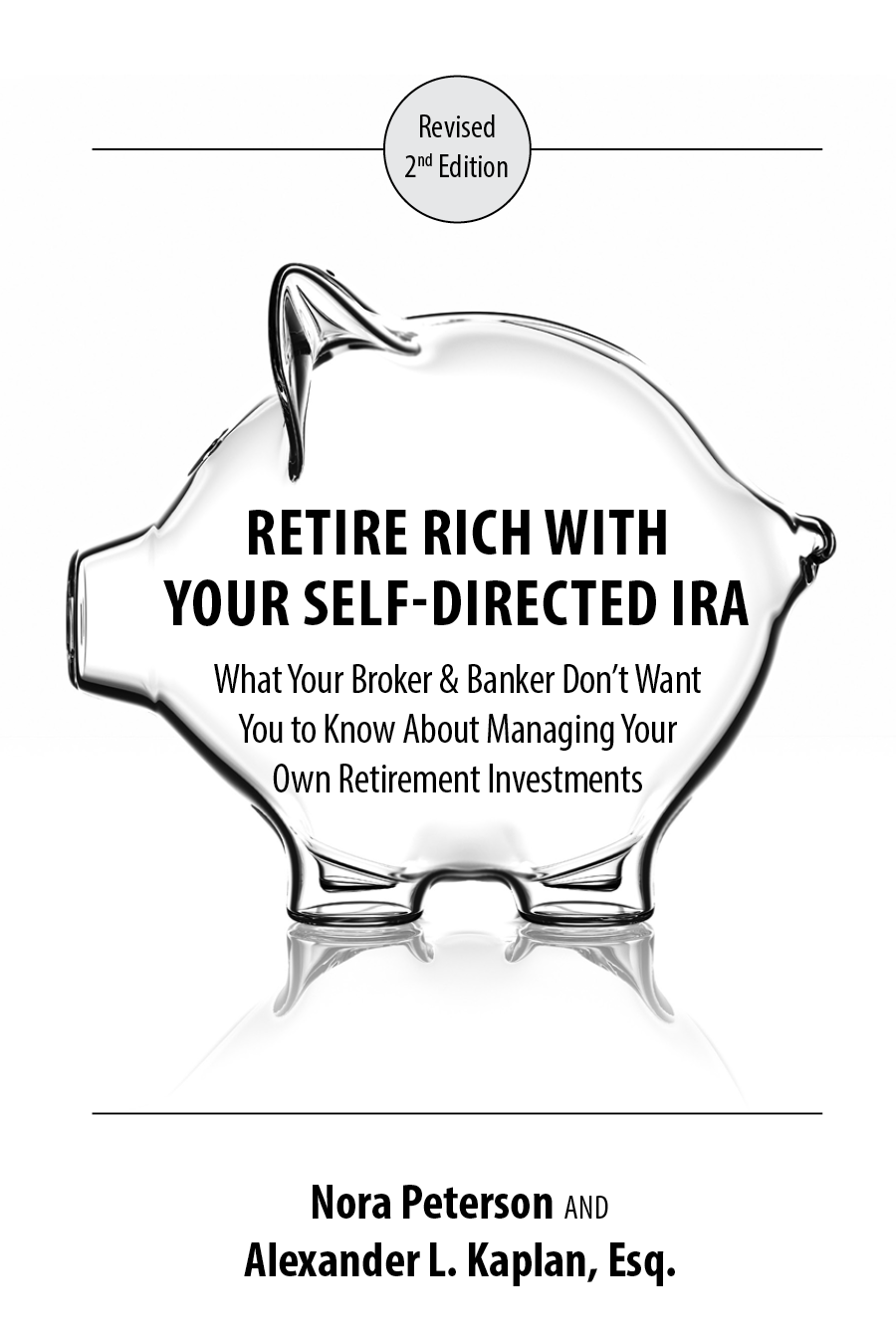
Retire Rich With Your Self-Directed IRA: What Your Broker & Banker Dont Want You to Know About Managing Your Own Retirement Investments Revised 2nd Edition
Copyright 2016 by Atlantic Publishing Group, Inc.1405 SW 6th Ave. Ocala, Florida 34471 800-814-1132 352-622-1875Fax Web site: www.atlantic-pub.com E-mail: sales@atlantic-pub.com SAN Number: 268-1250
No part of this publication may be reproduced, stored in a retrieval system, or transmitted in any form or by any means, electronic, mechanical, photocopying, recording, scanning, or otherwise, except as permitted under Section 107 or 108 of the 1976 United States Copyright Act, without the prior written permission of the Publisher. Requests to the Publisher for permission should be sent to Atlantic Publishing Group, Inc., 1405 SW 6th Ave., Ocala, Florida 34471.
Library of Congress Cataloging-in-Publication Data
Peterson, Nora, 1948
Retire rich with your self-directed IRA : what your broker & banker dont want you to know about managing your own retirement investments / Nora Peterson and Alexander L. Kaplan, Esq. -- Revised 2nd edition.
pages cm
Includes bibliographical references and index.
ISBN 978-1-60138-943-5 (alk. paper) -- ISBN 1-60138-943-4 (alk. paper) 1. Individual retirement accounts--United States. 2. Retirement income--United States. 3. Investments--United States. I. Title.
HG1660.U5P48 2015
332.02401450973--dc23
2014033744
DISCLAIMER: The material in this book is provided for informational purposes and as a general guide to starting your self-directed IRA. Basic definitions of laws are provided according to the status of the laws at the time of printing; be sure to check for a change or update in laws. This book should not substitute professional and legal counsel for the development of any business decisions or anything related to your self-directed IRA.
TRADEMARK: All trademarks, trade names, or logos mentioned or used are the property of their respective owners and are used only to directly describe the products being provided. Every effort has been made to properly capitalize, punctuate, identify and attribute trademarks and trade names to their respective owners, including the use of and wherever possible and practical. Atlantic Publishing Group, Inc. is not a partner, affiliate, or licensee with the holders of said trademarks.
Printed in the United States
BOOK PRODUCTION DESIGN: T.L. Price design@tlpricefreelance.com

Table of Contents
Foreword
Recognizing Opportunity
At the outset, let it be stated that this book is not a textbook on economics or investment advice; nor is it IRAs for Idiots. If we have taken a light-hearted approach to very complex legal and economic issues, so be it. After all, we dont want to lose the reader only after a few pages. It is the authors intent to provide a person with average intelligence and experience a starting point from which to secure and take control of his or her financial future and retirement without being bored to death.
No one chooses to retire poor, or even with just enough money to get by (at least not consciously). Yet, day in and day out, millions of Americans pass up the opportunity to change the course of their financial futures. Perhaps they dont recognize opportunity when it brushes shoulders with them as it passes by disguised as hard work, as Herbert V. Prochnow observed.
By opening the cover of this book (even if you only peek inside to see what this retire rich business is all about), youre at least willing to look for the opportunityand perhaps do a little work to get there. Thats only the start of the good news. Bear with us for a moment, and youll see exactly what we mean.
The next time youre at the gym, making small talk at a cocktail party, or refilling your mug at the coffee station at workany place where two or three people are standing around talkingask any one of them if theyve ever heard of a self-directed IRA. Then watch the expressions on their faces go from a puzzled look to confused frown to eyes glazed over. While youre watching, count the seconds it takes before someone changes the subject or suddenly remembers a phone call that needs to be made. Any conversation that includes words such as taxes , IRA (individual retirement account) , or investments will typically provoke that kind of response. Its like a money version of the flight-or-fight response. Sure, you might get lucky and get a sentence or two of polite conversation first, but odds are that before long, youll be standing there keeping yourself company. Thats when youre going to whip out this book and learn what everyone concerned about their financial security needs to know.
To be sure, your broker and banker would rather you didnt know about it. But, if youre willing to ask questions, ponder answers, locate a qualified IRA advisor, and put your newfound knowledge to work, then you can join the ranks of people who have turned their money into a workhorse. The only real question is, Why wouldnt everyone be willing to make that commitment?
Forty years after Congress established the IRA, U.S. taxpayers hold assets totaling in trillions of dollars in various types of IRA accounts. Some of that wealth was built a teaspoon at a time, by depositing the annual maximum contributions of $1,500, $2,000, or even $5,000, depending on the year in which they were made. More was built by dumping great big buckets of money from company and government retirement plans into personal IRA accounts.
Getting money into an IRA account is only the first step to building retirement wealth. How its managed and invested afterward is equally important. Consider this: Mutual fund holdings accounted for roughly $5.3 trillion, or about 30 percent of IRA assets in 2012. On the surface, that may sound like a good thing. After all, it means seasoned investment professionals tend to almost half of all IRA holdings.
This type of assurance shouldnt make the owners of those assets sleep better at night. The sad truth is that, as of 2012, 84 percent of all mutual funds have underperformed the stock market when earnings are adjusted to account for hefty fees charged by actively managed mutual funds. For the small percentage of investors who turn out to be both astute and lucky enough to enjoy better-than-average growth in their investments, the IRS waits on the horizon to collect its fair (rather unfair) share right off the top.
The challenge to retiring rich, then, is twofold: first, to make money and second, to keep as much of it for yourself as the law will allow.
That may seem like a pretty tall order. Tax law only works for the benefit of the rich, right? Those who can afford to hire high-priced lawyers and tax professionals to find the loopholes in the law doesnt apply to the average Joe. Not so.
We wont lie and say its easy; very few things of value ever are. But, believe it or not, the IRS has provided the tools to make it possible. The only thing standing between you and retiring rich is your willingness to use them.
If youre part of the vast majority of IRA holders with money sitting in traditional investments like stocks, mutual funds, and annuities, dont hold your breath waiting for your broker or banker to clue you in on the possibilities.


